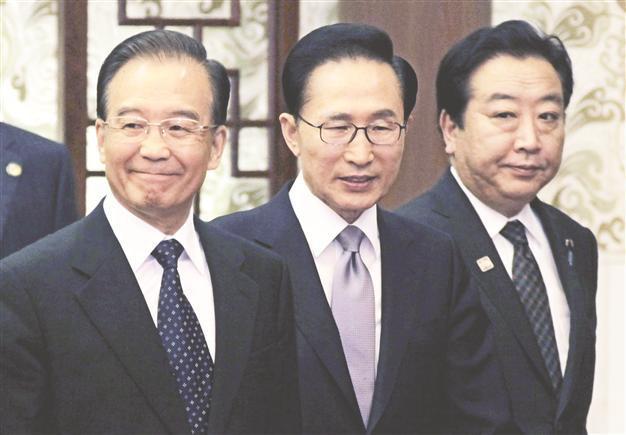Asian giants strike deal to start talks on three-way trade pact
BEIJING - Reuters

China’s Premier Wen Jiabao, (L), South Korea’s President Lee Myung-bak (C) and Japan’s Prime Minister Yoshihiko Noda arrive at a joint news conference of the fifth trilateral summit among the three nations at the Great Hall of the People in Beijing yesterday. Northeast Asia is the most economically vibrant region in the world Jiabao says. REUTERS Photo
China,
Japan and
South Korea agreed at a summit yesterday to launch negotiations for a three-way free trade pact they said could help fend off global economic chills, but the talks are expected to be long and difficult because of decades of rivalry.
The three nations are major traders, and together accounted for 19.6 percent of global gross domestic product and 18.5 percent of exports in 2010, according to a feasibility study issued by their governments last year on the trade pact.
“Northeast
Asia is the most economically vibrant region in the world,” Chinese Premier Wen Jiabao told reporters after talks in Beijing with Japanese Prime Minister Yoshihiko Noda and South Korean President Lee Myung-bak.
“The establishment of an FTA will unleash the economic vitality of our region and give a strong boost to economic integration in east Asia.”
Largest trade partnersChina is the biggest trade partner of Japan and South Korea. A free trade treaty could lift China’s GDP by up to 2.9 percent, Japan’s by 0.5 percent, and South Korea’s by 3.1 percent, the official Xinhua news said in a commentary, without citing the basis for its estimates.
But agreeing on a fully-fledged pact, which has been on the table for a decade, will not be easy.
The three northeast Asian neighbors are divided by political distrust, trade barriers, and diverging investment policies, as well as region-wide worries about China’s expanding economic and military power.
The proposed treaty must also vie for attention with the United States’ push for a broader Trans-Pacific Partnership, a trade liberalization initiative that has drawn in nine countries, with Japan also expressing interest. Ch i na and South Korea are not part of those negotiations yet.
At the summit in Beijing, the three leaders also agreed a three-way investment treaty - a stepping stone to the bigger and much more contentious goal of a free trade deal - said Xinhua.
China’s Ministry of Commerce said on its website that the (www.mofcom.gov.cn) investment agreement will help smooth tax, dispute resolution and other issues among the three nations.
“Japan, South Korea and China play an important role in the global economic recovery,” said South Korea’s President Lee. “When the economy is in crisis, it’s more pressing to set up a free trade zone,” he told a business meeting that took place parallel to the leaders’ summit.
Intra-regional trade and investment levels between China, Japan and South Korea were “much lower” than levels in the European Union or across the North American Free Trade Agreement area.
Yet even host China acknowledged the negotiations on a three-way trade agreement to begin are likely to be difficult.
“The conclusion of the feasibility study in 2011 and the nearly finalization of the three-way investment treaty has paved the way for launching the FTA talks, but that only marks one step forward along the long negotiation journey,” Xinhua said.
“More importantly, political trust is badly needed in this sensitive region, not only in political affairs but also in economic ties.”
Tokyo and Beijing have long been in dispute over territorial claims in the East China Sea, where both sides stake claims to potentially valuable gas beds.
Demands over North KoreaBeijing also faces insistent demands from Tokyo and Seoul to put more pressure on North Korea, whose nuclear weapons ambitions and rocket tests have alarmed the region.
The plan for a three-way northeast Asian free trade pact jostles alongside other proposals to enhance regional economic flows, especially the Obama administration’s promotion of the Trans-Pacific Partnership.
Policy-makers in Beijing worry that U.S. influence could erode Chinese sway across the region.
Japan’s Prime Minister Noda said he saw no conflict between the two trade negotiation proposals.
“We will promote the TPP and the trilateral FTA in parallel,” Noda told reporters. “These efforts can be mutually reinforcing to each other.”
